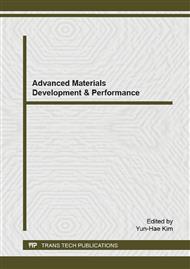p.3
p.7
p.13
p.19
p.23
p.27
p.32
p.36
Effect of Thermal Cycling after Water Absorption on Flexural Property of CFRP
Abstract:
In this study, effect of thermal cycling after water absorption on flexural property of CFRP(Carbon Fiber Reinforced Plastics) was examined. Water absorption tests were conducted for 24 hours, 100 hours and 500 hours at 90°C. Thermal cycling test was conducted by using water absorbed specimen. The temperature range of thermal cycling test was from room temperature to-196°C. The static three-point flexural test of CFRP with freezing after water absorption was conducted based on JIS(Japanese Industrial standard) K 7074. Following conclusions are obtained. In case of immersion for 24 hours, flexural strength and modulus of CFRP with freezing after water absorption decreased with an increase of the number of cycles. In case of immersion for 100 hours and 500 hours, flexural strength and modulus of CFRP with freezing after water absorption did not change. The water absorption of CFRP was the phenomenon that the water penetrated into fiber/resin interface. So, in the case of immersion for 24 hours that the absorption time is not so long, damage progresses gradually in thermal cycling test. On the other hand, in the case of immersion for 500 hours is long, the damage progresses at the early stage of the thermal cycling test, and after that the damage does not almost progress.
Info:
Periodical:
Pages:
19-22
DOI:
Citation:
Online since:
June 2015
Authors:
Price:
Сopyright:
© 2015 Trans Tech Publications Ltd. All Rights Reserved
Share:
Citation:


